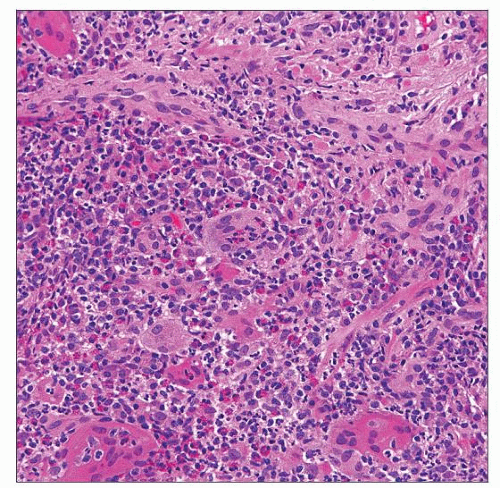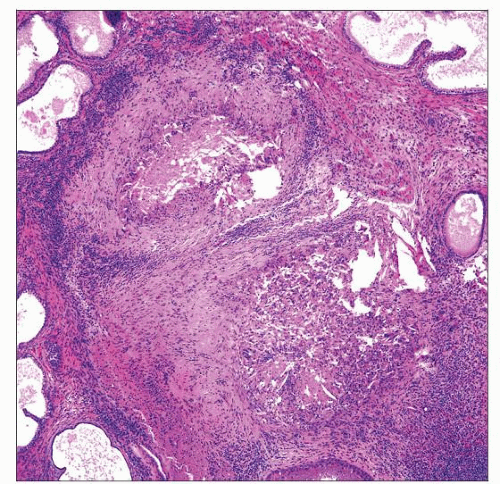Prostatitis
Gladell P. Paner, MD
Key Facts
Terminology
Granulomatous prostatitis
Inflammation of prostate containing granuloma
Types: NSGP, postprocedural GP, IGP, systemic GP, xanthogranulomatous prostatitis
Prostatitis syndrome
Group of inflammatory and noninflammatory conditions of prostate characterized by genitourinary or pelvic pain
NIH classification: Acute bacterial prostatitis, chronic bacterial prostatitis, chronic prostatitis/chronic pelvic pain syndrome, asymptomatic inflammatory prostatitis
Clinical Issues
GP seen in 0.8% of benign prostate specimens
NSGP most common comprising 50-78% of GP
Prostatitis syndrome accounts for about 1/4 of male clinic visits with genitourinary complaints
Microscopic Pathology
NSGP
Expansile nodular infiltrates usually involving entire lobules
Epithelioid histiocytes, lymphocytes, plasma cells, neutrophils, variable eosinophil infiltrates
PTG
Necrobiotic granulomas or central fibrinoid necrosis surrounded by palisaded histiocytes
Diagnosis of specific category of prostatitis syndrome requires clinical, microbiologic, and laboratory correlation
Acute or chronic inflammation in prostate biopsies should not be labeled as “prostatitis”
 Nonspecific GP shows admixture of multinucleated giant cells, epithelioid histiocytes, lymphocytes, plasma cells, and eosinophils. This is the most common GP. |
TERMINOLOGY
Abbreviations
Granulomatous prostatitis (GP)
Nonspecific granulomatous prostatitis (NSGP)
Post-transurethral resection granuloma (PTG)
Infectious granulomatous prostatitis (IGP)
Definitions
GP
Inflammation of prostate containing granulomata
Types of granulomatous prostatitis
Nonspecific granulomatous prostatitis
Postprocedural GP
Post-transurethral resection GP
Post-needle biopsy GP
Infectious granulomatous prostatitis
Bacillus Calmette-Guérin (BCG)-related granuloma
Bacterial, e.g., Mycobacterium tuberculosis (most common), Treponema pallidum, Brucella abortus, Escherichia coli
Fungal, e.g., Blastomyces, Cryptococcus
Parasitic, e.g., Schistosoma haematobium
Viral, e.g., herpes zoster
Systemic or secondary GP
Allergic (eosinophilic) GP
Churg-Strauss syndrome
Wegener granulomatosis
Xanthogranulomatous prostatitis
Prostatitis syndrome
Group of inflammatory and noninflammatory conditions of prostate characterized by genitourinary or pelvic pain
Defined by International Prostatitis Collaborative Network under the National Institute of Health (NIH)
Diagnosis follows clinical, microbiological, and laboratory criteria; histopathologic (i.e., biopsy) diagnosis less crucial or may not be required
Histologic changes of prostatic inflammation overlaps among entities of prostatitis syndrome and other causes
NIH consensus classification of prostatitis syndrome
Acute bacterial prostatitis
Chronic bacterial prostatitis
Chronic prostatitis/chronic pelvic pain syndrome
Inflammatory
Noninflammatory
Asymptomatic inflammatory prostatitis
ETIOLOGY/PATHOGENESIS
Nonspecific Granulomatous Prostatitis
Inflammatory reaction to altered prostatic acini &/or secretions from duct blockade, bacterial products, or refluxed urine is suggested
Possibly autoimmune based
HLA-DR15-linked T-cell response against proteins in prostatic secretion, principally PSA
Postprocedural Granulomatous Prostatitis
Inflammatory response to traumatic injury
CLINICAL ISSUES
Epidemiology
Incidence
Granulomatous prostatitis
0.8% of benign prostate specimens
0.36% of prostate needle biopsies
Nonspecific GP most common (50-78% of GP)
Stay updated, free articles. Join our Telegram channel

Full access? Get Clinical Tree



